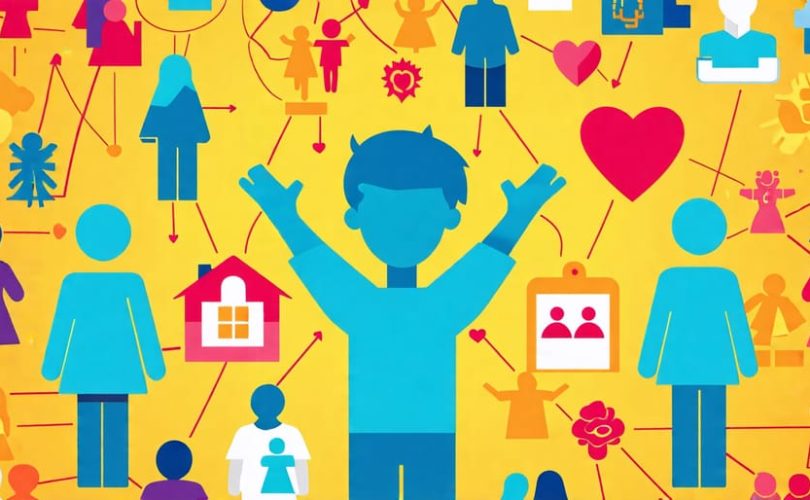Unlock the power of your community to uplift children’s mental well-being. 5 Inspiring Community Support Examples showcase the transformative impact of collaborative efforts. From school-based programs to peer support groups, discover the diverse range of resources available to foster resilience and promote healthy development. Engage with local organizations, healthcare providers, and educational institutions to build a robust network of support. Together, we can create a nurturing environment where every child can thrive.
Types of Community Supports
Mental Health Services
Community mental health organizations and clinics provide a wide range of services to support children’s emotional well-being. These services are often delivered by compassionate professionals who understand the unique challenges children face. Therapy is a common offering, which involves working with a trained counselor to address specific mental health concerns, such as anxiety, depression, or trauma. Through age-appropriate techniques like play therapy or cognitive-behavioral therapy, children can learn coping skills and build resilience. Counseling services may also be available to help children navigate life transitions, family conflicts, or social difficulties. For children with more complex mental health needs, psychiatric care may be necessary. This can include evaluation, diagnosis, and medication management under the guidance of a child psychiatrist. Many community mental health centers offer a combination of these services, ensuring that children receive comprehensive care tailored to their individual needs. By accessing Community Support Services, parents can connect their children with the resources they need to thrive. These services are often provided on a sliding scale or with insurance coverage, making them accessible to families from diverse backgrounds. With the right support, children can develop the tools to manage their mental health and build a strong foundation for lifelong well-being.

Family Support Groups
Family support groups offer a unique opportunity for parents to connect with others who understand the challenges of raising a child with mental health needs. In these safe and non-judgmental spaces, parents can share their experiences, struggles, and triumphs, finding comfort in knowing they are not alone. Through open discussions and expert-led sessions, parents gain valuable insights, practical strategies, and coping mechanisms to better support their children’s well-being. These groups also provide a platform for parents to learn about the latest research, treatment options, and community resources available to them. By fostering a sense of community and empowerment, family support groups help parents build resilience, reduce stress, and improve their overall ability to navigate the complex journey of parenting a child with mental health challenges. Ultimately, these connections not only benefit the parents but also create a positive ripple effect on the entire family’s well-being and the child’s path to recovery.

Educational Resources
Educational resources are vital for parents and caregivers seeking to better understand and support their child’s mental health. Many organizations offer workshops, seminars, and online courses that provide valuable insights and practical strategies. These resources cover topics such as recognizing signs of mental health struggles, effective communication techniques, and creating a supportive home environment. Workshops and seminars often feature expert speakers, including psychologists, therapists, and experienced parents, who share their knowledge and experiences. Online courses offer the flexibility to learn at your own pace and from the comfort of your home. They often include interactive elements, such as quizzes and discussion forums, to enhance the learning experience. By participating in these educational opportunities, parents and caregivers can gain the skills and confidence needed to navigate the challenges of supporting a child’s mental well-being. With increased understanding and empathy, families can create a strong foundation for their child’s optimal mental health and development.
Community Outreach Programs
Community outreach programs play a vital role in promoting mental health awareness and reducing the stigma surrounding mental health challenges. These programs often involve partnerships between schools, healthcare providers, and community organizations to educate families about available resources and support services. Through workshops, seminars, and community events, outreach programs aim to foster open conversations about mental health and empower families to seek help when needed. They may also provide screenings and referrals to connect families with appropriate mental health professionals. By creating a supportive and inclusive environment, community outreach programs help to build resilience and promote the well-being of children and families.
Accessing Community Supports
Identifying Your Child’s Needs
Identifying your child’s mental health needs is a crucial first step in finding the right community support. Start by observing your child’s behavior, mood, and overall well-being. Look for signs such as persistent sadness, anxiety, irritability, or changes in sleep or eating habits. If you notice any concerning patterns or symptoms, talk to your child in a supportive, non-judgmental way. Listen to their concerns and validate their feelings. Consider consulting with your child’s pediatrician or a mental health professional who can provide a proper assessment and recommend appropriate Types of Treatment. They can help you determine whether your child would benefit from individual therapy, family counseling, support groups, or other community-based interventions. Remember, seeking help is a sign of strength and demonstrates your commitment to your child’s well-being.

Locating Resources in Your Area
Finding local mental health services, support groups, and educational programs can seem daunting, but there are several resources available to help. Start by speaking with your child’s pediatrician or school counselor, as they often have lists of recommended providers and organizations in your area. Online directories, such as the Psychology Today Therapist Finder, can also be valuable tools for locating mental health professionals who specialize in working with children and adolescents. Many communities have family resource centers that provide information on local support groups, workshops, and classes related to children’s mental health. Don’t hesitate to reach out to your local government’s health department or social services office for guidance. Remember, seeking help is a sign of strength, and there are compassionate professionals and organizations ready to support you and your child on the path to better mental health.
Overcoming Barriers to Access
Despite the numerous benefits of community supports, many families face barriers when trying to access these services. Cost is a significant hurdle, as some programs may require fees or insurance coverage. Transportation can also be challenging, especially for families in rural areas or those without reliable access to public transit. Additionally, the stigma surrounding mental health issues can make some parents hesitant to seek help for their children.
To overcome these obstacles, communities can work together to provide affordable or free programs, offer transportation assistance or mobile services, and educate the public about the importance of mental health support. Schools, healthcare providers, and local organizations can collaborate to create a network of accessible resources for families in need. By addressing these barriers head-on, we can ensure that all children have the opportunity to benefit from the power of community support.
The Impact of Community Supports
Improved Mental Health Outcomes
Research has consistently shown that community supports can significantly improve mental health outcomes for children. A study published in the Journal of Child Psychology and Psychiatry found that children who received community-based interventions experienced a 50% reduction in mental health symptoms compared to those who did not receive support. Another study by the National Institute of Mental Health revealed that early intervention through community programs can prevent up to 70% of potential mental health issues in children. These findings highlight the crucial role that community supports play in promoting the emotional well-being of our youth and emphasize the importance of making these resources readily available to families in need.
Stronger Family Relationships
Community supports can play a vital role in strengthening family bonds. By providing resources, education, and a supportive network, these programs help families better understand and communicate with one another. For example, parent support groups offer a safe space to share experiences, learn from others, and develop effective parenting strategies. Family therapy sessions, often available through community mental health centers, facilitate open dialogue and problem-solving within the family unit. Additionally, community events and activities provide opportunities for families to spend quality time together, fostering a sense of connection and shared purpose. By engaging with these supports, families can build resilience, improve relationships, and create a more nurturing home environment for their children.
Conclusion
Community supports play a vital role in promoting children’s mental health and well-being. By providing early intervention, ongoing assistance, and a network of caring professionals, these supports can make a significant difference in a child’s life. Remember, seeking help is a sign of strength, not weakness. If you have concerns about your child’s mental health, don’t hesitate to reach out to your local community supports. With the right resources and support, children can develop the resilience and coping skills they need to thrive. Together, we can create a brighter future for our children by prioritizing their mental health and ensuring they have access to the supports they need to navigate life’s challenges.







